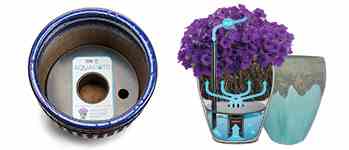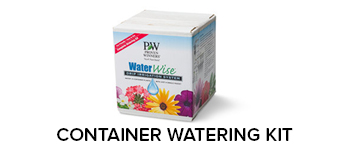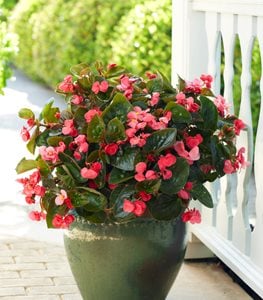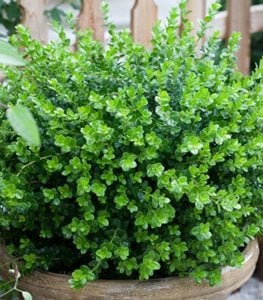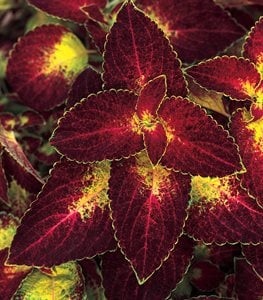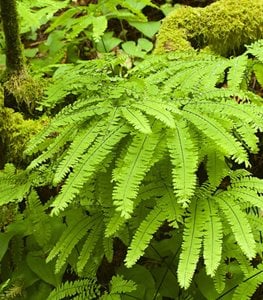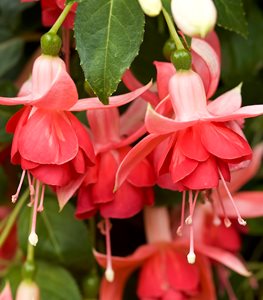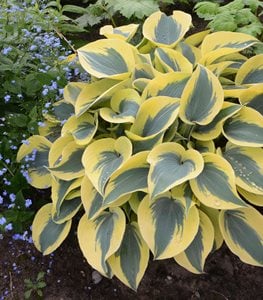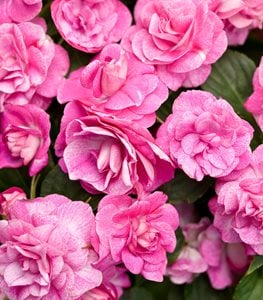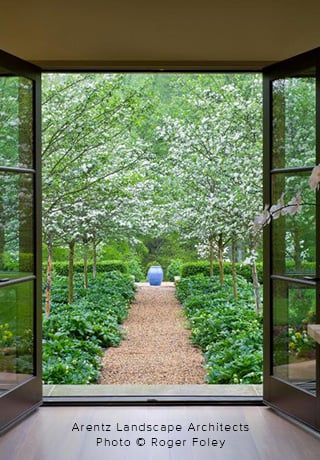CONTAINER PLANTS MADE FOR THE SHADE
Liven up dark corners of your garden with these tips and plant combinations that thrive in low light.Nearly every gardener has experienced the problem of too much shade, which can cause plants to become too leggy or fail to thrive. Whether it's a wooded suburban lot or a north-facing apartment balcony, low light means more growing challenges. Rather than being problematic, these dark areas can be viewed as an opportunity. Adding containers to shady spots is a practical way to optimize these spaces.
Add additional color with brightly colored or shiny metal pots combined with lighter or contrasting hues of foliage and flowers. Decorative arrangements can brighten up even the darkest corner of a porch, deck, or entryway.
On this page:- 11 SHADE PLANTS FOR POTS
- TIPS FOR CHOOSING PLANTS
- CONTAINER IDEAS FOR SHADE
- OPTIMIZE GROWING CONDITIONS
11 SHADE PLANTS FOR POTS
BEGONIA
Zones: 8-11, grown as an annual in most regions
Exposure: Partial sun to shade
Habit: Mounding, bushy, or upright habit
Height/Spread: 6 to 36 inches tall, 6 to 12 inches wide
This versatile annual is grown for its exceptionally long bloom time and wide range of flower colors and leaf patterns. Use as a “filler” element in a mixed container arrangement alongside trailing vinca and upright coleus. Use to brighten up window boxes and hanging baskets in challenging shade areas.
Learn more about growing begonias.
Pictured: Surefire® Rose begonia from Proven Winners
BOXWOOD
Zones: 4-9
Exposure: Part sun to dappled shade
Habit: Mounding or upright habit
Height/Spread: 1 to 20 feet tall, 2 to 8 feet wide
Widely used in formal landscapes, boxwood shrubs lend structure and year-round color. Shape into sculptural topiaries and place in classic urns on either side of a porch or entryway for an elegant first impression.
Learn more about growing boxwood.
Pictured: Sprinter® boxwood from Proven Winners
COLEUS
Zones: 10-11, grown as an annual in most regions
Exposure: Partial sun to shade; protect from hot afternoon sun
Habit: Mounding, upright, or trailing habit
Height/Spread: 6 to 26 inches tall and wide
Coleus is a staple of summertime gardens, grown for its nearly endless palette of leaf colors from purple to chartreuse, and stained glass patterns that add bold exuberance to any landscape. Use upright forms as a “thriller” element, mounding types as a “filler”, or trailers as a “spiller” in a container.
Learn more about growing coleus.
Pictured: ColorBlaze® Dipt in Wine from Proven Winners
FERN
Zones: 3-11
Exposure: Partial sun to shade
Habit: Varies according to genus and species
Height/Spread: Varies according to genus and species
Learn more about different types of ferns.
Add a naturalized woodland effect to your landscape with the lush look of ferns. Many are reliably hardy and do well in containers, such as Japanese painted fern, maidenhair fern, wood fern, and lady fern. Plant as a stand-alone element in a formal container or hanging basket. Combine as a “filler” with coleus, creeping Jenny, vinca, caladium, or coral bells.
FUCHSIA
Zones: 6-11 depending on variety; most are treated as annuals in colder regions
Exposure: Partial sun to shade; most need protection from hot afternoon sun
Habit: Upright, bushy, or trailing habit
Height/Spread: 6 to 72 inches tall and 6 to 48 inches wide
Fuchsias come in a dizzying array of flower colors, with prolific bloom through much of the growing season. One of the most popular hanging basket plants, trailing varieties are also suited to window boxes. Use an upright form such as ‘Gartenmeister’ as a “thriller” in a container by itself or in combination with other shade lovers.
HELLEBORE
Zones: 4-9; evergreen in 6-9
Exposure: Partial sun to partial shade
Habit: Mounding or upright habit
Height/Spread: 8 to 48 inches tall and 12 to 36 inches wide
Winter-flowering hellebores are prized for their evergreen foliage and range of flower colors at a time when little else is in bloom. These tough carefree perennials do well in containers by themselves or with other winter bloomers such as small witch hazels and early bulbs including crocus and snowdrops.
Learn more about growing hellebores.
Pictured: Honeymoon® Paris in Pink from Proven Winners
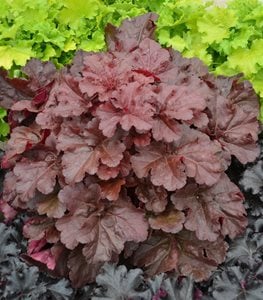
Primo® ‘Pretty Pistachio’, Primo® ‘Mahogany Monster’, and Primo® ‘Black Pearl’. Photo by: Proven Winners.
HEUCHERA, CORAL BELLS
Zones: 4-9
Exposure: Partial sun to partial shade
Habit: Mounding or spreading habit
Height/Spread: 6 to 18 inches tall and 12 to 30 inches wide
One of the most versatile perennials, coral bells are valued for their range of foliage shapes and colors, ease of growing and tolerance of a wide range of light and soil conditions. Color coordinate as a “filler” in a cheerful ceramic container alongside coleus, small ornamental grasses, astilbe, or hosta.
Learn more about growing coral bells.
Pictured: (top to bottom) Primo® 'Pretty Pistachio', Primo® 'Mahogany Monster', Primo® 'Black Pearl' from Proven Winners
HOSTA
Zones: 3-9
Exposure: Partial sun to full shade
Habit: Mounding spreading habit
Height/Spread: 6 to 48 inches tall and 14 to 72 inches wide
Known as queen of the shade border, hosta is grown for its attractive foliage in an array of colors, patterns and sizes. This easy-care perennial can be used as a stand-alone accent in a container or combined with ferns, astilbe, bleeding heart, lungwort, barrenwort, or spring bulbs.
Learn more about growing hostas.
Pictured: Shadowland® 'Autumn Frost' from Proven Winners
HYDRANGEA
Zones: 3-9
Exposure: Partial sun to full shade
Habit: Mounding or upright bushy habit
Height/Spread: 3 to 15 feet tall and 3 to 12 feet wide
A favorite summer-blooming shrub, with dwarf varieties such as Little Quick Fire® or Invincibelle Wee White® performing well in containers. Long-lasting flowers in an array of colors are eye-catching by themselves or when underplanted with impatiens, begonias, ferns, or lady’s mantle.
Learn more about growing hydrangeas.
Pictured: Little Quick Fire® from Proven Winners
IMPATIENS
Zones: 10-12, grown as an annual in most regions
Exposure: Partial sun to full shade
Habit: Mounding spreading habit
Height/Spread: 6 to 36 inches tall and 1 to 3 feet wide
For nonstop bloom all summer long, nothing beats impatiens for brightening up deeply shaded areas. With a wide range of flower colors, impatiens are most commonly used as a bedding plant, though they thrive in containers as well. Mass in a color bowl or use as a “filler” in shaded window boxes and hanging baskets.
Learn more about growing impatiens.
Pictured: Rockapulco® Rose from Proven Winners
TORENIA, WISHBONE FLOWER
Zones: 10-11, grown as an annual in most regions
Exposure: Partial sun to shade
Habit: Mounding or trailing habit
Height/Spread: 8 to 16 inches tall, 8 to 12 inches wide, trailing up to 36 inches long
This underutilized annual blooms prolifically all summer long with snapdragon-like flowers in a range of colors that brighten up deeply shaded areas. Mass in a color bowl or combine with small ferns, hosta, astilbe, or coral bells.
Learn more about growing wishbone flower.
Pictured: Catalina® Midnight Blue wishbone flower from Proven Winners
Featured in: Garden Design's Top 10 Garden Trends for 2022 ("Maximizing Balconies & Porches")
TIPS FOR CHOOSING SHADE PLANTS FOR POTS
- Many garden specimens will thrive equally well in containers, given the right conditions.
- A single plant, such as Japanese maple or bamboo, can be just as compelling as a combination.
- Plants with attractive foliage, like coleus, offer reliable season-long color with a nearly endless array of colors. Other reliable foliage standbys include Japanese painted fern, sweet potato vine, and Rex begonias.
- Flowering plants like impatiens, fuchsias, or begonias such as ‘Bonfire’ add color. One underutilized alternative to annual bedding impatiens is Torenia (wishbone flower), which blooms consistently over several months in colors of blue, purple, pink, and yellow.
- There are no hard and fast rules to mixing and matching plants for shade containers. Breaking the rules can result in some unexpectedly delightful surprises.
CONTAINER IDEAS FOR SHADE
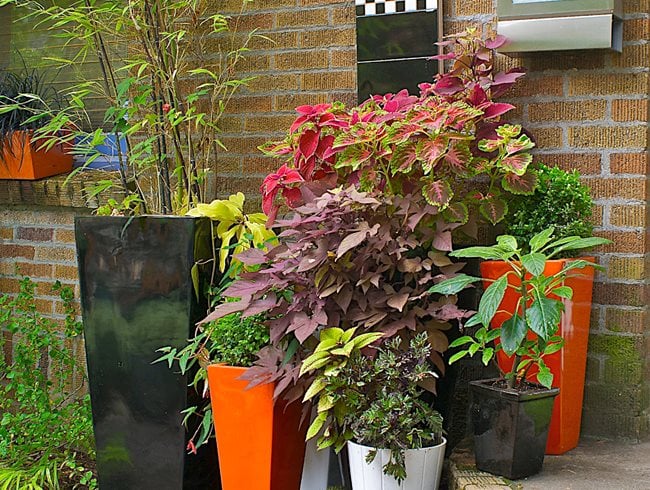
Pots in this shaded entry garden are grouped together for greater impact. Phyllostachys nigra (black bamboo), offers structure and height. Other plants include ‘Kong’, ‘Sedona’ and ‘Chocolate Mint’ coleus, ‘Mardi Gras’ and ‘Margarita’ sweet potato vines, and ‘Bonfire’ begonia. Photo by: Janet Loughrey. Design by: JJ De Sousa.
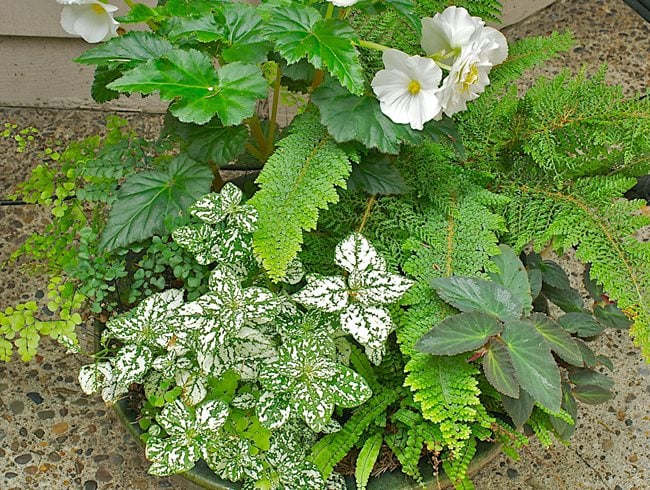
For shade containers, Vina Winters chooses a foliage specimen such as Hypoestes (polka dot plant) and pairs it with a similarly hued flower such as tuberous begonia. Soft shield and maidenhair ferns provide contrasting texture and shape. Photo by: Janet Loughrey. Design by: Vina Winters.
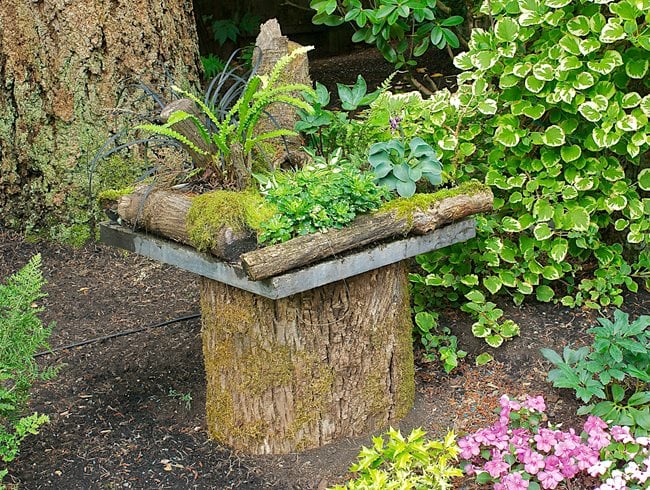
A stump is cleverly recycled as the base for a shallow log container that blends perfectly with the landscape. The emphasis is on woodland foliage, with hart’s tongue and deer ferns, moss, and native sedums. A small hellebore and Hosta ‘Tiny Mice’ complete this serene combination. Photo by: Janet Loughrey. Design by: Vina Winters.
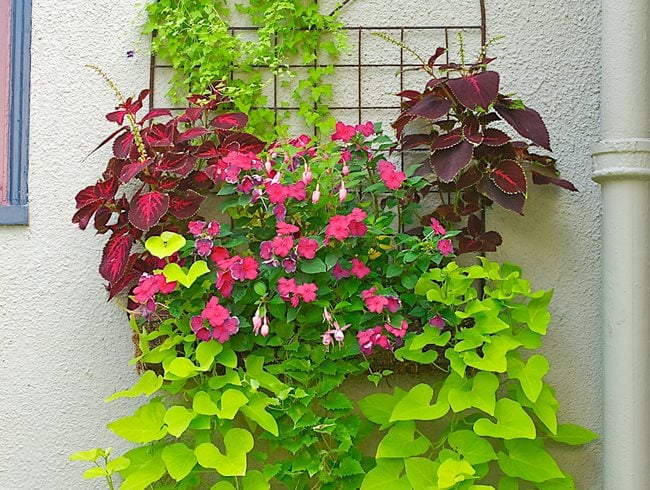
A north-facing wall is softened by this hanging planter of pink impatiens and fuchsias flanked by ‘Kingswood Torch' coleus. Asarina (climbing snapdragon) adds height, while ‘Margarita’ sweet potato vines trail gracefully over the side. Photo by: Janet Loughrey. Design by: Lucy Hardiman.
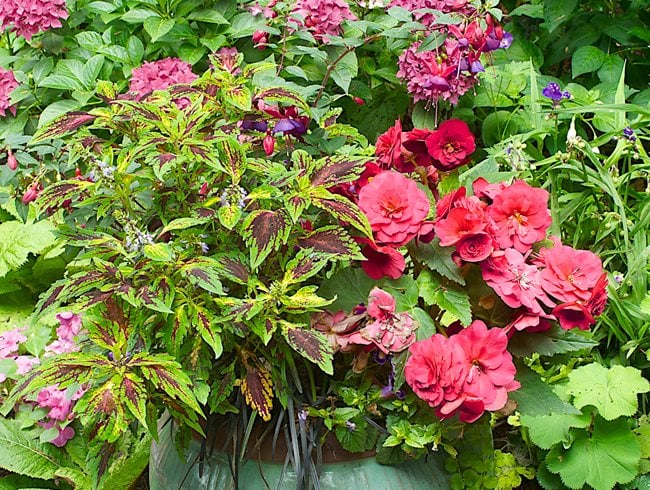
The crimson hue of mophead hydrangeas is echoed by red tuberous begonias planted in a teal, ceramic pot. Coleus ‘Wizard Sport’, black mondo grass, and creeping Jenny create a layered effect. Photo by: Janet Loughrey. Design by: Vina Winters.
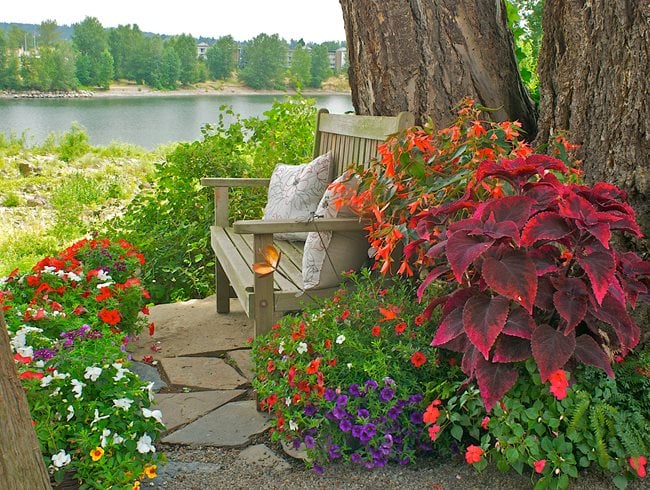
This secluded riverside retreat is adorned with million bells, impatiens, and ferns. ‘Religious Radish’ coleus and ‘Bonfire’ begonias in a pot alongside the bench provide a dramatic burst of color. Photo by: Janet Loughrey. Design by: Cheryl Borden.
OPTIMIZE GROWING CONDITIONS
- Good growing conditions are essential to healthy shade container plantings. Use high-quality potting soil and replenish it annually. (See more: Potting Soil 101.)
- Mix a time-release fertilizer into the top several inches of soil before planting.
- Frequent watering during hot summer months causes nutrients to quickly leach out of the soil. To counter this, supplement with a water-soluble fertilizer every other week in midsummer.
Get inspired with more shade container recipes from Proven Winners.
RELATED:
20 Great Plants for Shade
Container Gardens
Container Plants for Sun
8 Expert Tips for Shade Combinations
